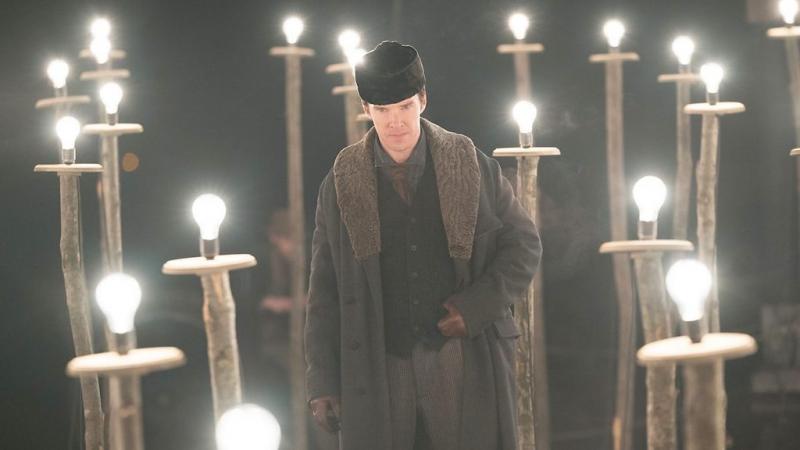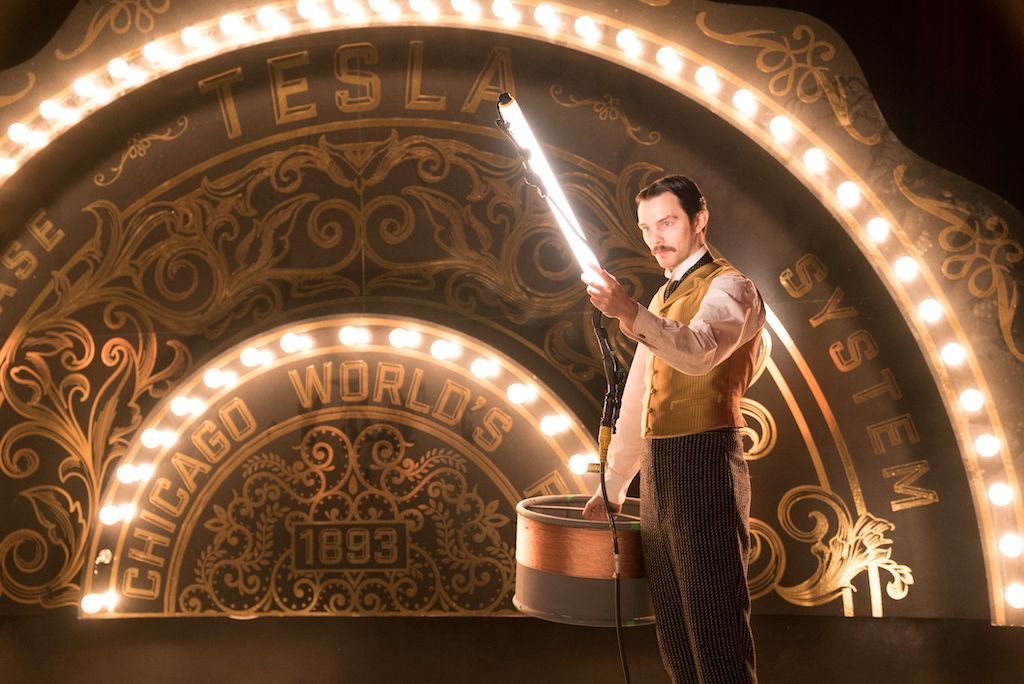The Current War review – lacks the spark of invention | reviews, news & interviews
The Current War review – lacks the spark of invention
The Current War review – lacks the spark of invention
Benedict Cumberbatch and Michael Shannon in the battle to light up America

We like to think of scientists and inventors as innocent dreamers, trampled upon by the cruel old world. Of course, that’s not wholly true. Just look at today’s tech and social media industries. In fact the man cited as America’s greatest ever inventor, Thomas Edison, was a real scoundrel who wasn’t adverse to using dirty tricks to get ahead.
The Current War is named after the infamous battle of wits in the US in the 1880s, between Edison (Benedict Cumberbatch) and the entrepreneur George Westinghouse (Michael Shannon), over who would provide electricity to illuminate and ultimately power the country – and change the world. And rather than the joy of discovery, it concerns itself with the cutthroat machinations that often follow that "eureka" moment.
The film has had a difficult history, opening to poor reviews at the Toronto Film Festival two years ago, just before the public disgrace of its producer Harvey Weinstein. It’s finally been dusted off, with a new edit by director Alfonso Gomez-Rejon that shouldn’t be dismissed outright.
Driven by an intelligent script and agreeable cast, it’s a fascinating, beautifully designed film, which evokes arguably the most inventive decade in history, while reflecting on the varying motivations – ego, money, philanthropy, visionary instinct – that drove progress.  The opening scene establishes the showman Edison’s modus operandi (as well as the director’s visual intent). A train stops in the middle of nowhere in the dead of night. A group of businessmen disembark and start walking through the dark and mud, until suddenly a field of lightbulbs sparks magically into life.
The opening scene establishes the showman Edison’s modus operandi (as well as the director’s visual intent). A train stops in the middle of nowhere in the dead of night. A group of businessmen disembark and start walking through the dark and mud, until suddenly a field of lightbulbs sparks magically into life.
With the deep pockets of his benefactor JP Morgan (Matthew McFadyen), Edison feels that he’s in the driving seat for the introduction of this new-fangled thing called electricity. But along comes Westinghouse with a cheaper and more efficient solution, literally the AC to Edison’s DC. The genial businessman wants to partner up; not only does Edison refuse, but en route to their showdown at the Chicago World’s Fair he will use appalling smear tactics in an attempt to destroy his rival.
If you want to cast a genius or maverick with questionable people skills, then Cumberbatch – with the likes of Alan Turing, Julian Assange and Sherlock Holmes in his back pocket – is your man. Or is he? Though Cumberbatch is as skilled as ever here, that particular schtick is wearing thin.
Shannon is more interestingly cast against type as Westinghouse, a man as determinedly decent and dull as Edison is charismatically self-serving. Nicholas Hoult (pictured above) offers nimble support as Nikola Tesla – the visionary émigré who sides with Westinghouse and whose penury never gets in the way of a good suit – and Katherine Waterstone shows Marguerite Westinghouse to be the formidable equal to her husband.
Gomez-Rejon boisterously uses an array of camera tricks – zooms, swooning crane shots, jump-cuts – to capture the excitement felt at this most creative of times. But what he fatally fails to conjure, until it’s too late, is the thrill of invention itself. In that sense, this lacks the dramatic spark of Cumberbatch’s Turing saga, and far superior The Imitation Game.
The future of Arts Journalism
You can stop theartsdesk.com closing!
We urgently need financing to survive. Our fundraising drive has thus far raised £49,000 but we need to reach £100,000 or we will be forced to close. Please contribute here: https://gofund.me/c3f6033d
And if you can forward this information to anyone who might assist, we’d be grateful.

Subscribe to theartsdesk.com
Thank you for continuing to read our work on theartsdesk.com. For unlimited access to every article in its entirety, including our archive of more than 15,000 pieces, we're asking for £5 per month or £40 per year. We feel it's a very good deal, and hope you do too.
To take a subscription now simply click here.
And if you're looking for that extra gift for a friend or family member, why not treat them to a theartsdesk.com gift subscription?
more Film
 Bugonia review - Yorgos Lanthimos on aliens, bees and conspiracy theories
Emma Stone and Jesse Plemons excel in a marvellously deranged black comedy
Bugonia review - Yorgos Lanthimos on aliens, bees and conspiracy theories
Emma Stone and Jesse Plemons excel in a marvellously deranged black comedy
 theartsdesk Q&A: director Kelly Reichardt on 'The Mastermind' and reliving the 1970s
The independent filmmaker discusses her intimate heist movie
theartsdesk Q&A: director Kelly Reichardt on 'The Mastermind' and reliving the 1970s
The independent filmmaker discusses her intimate heist movie
 Blu-ray: Wendy and Lucy
Down-and-out in rural Oregon: Kelly Reichardt's third feature packs a huge punch
Blu-ray: Wendy and Lucy
Down-and-out in rural Oregon: Kelly Reichardt's third feature packs a huge punch
 The Mastermind review - another slim but nourishing slice of Americana from Kelly Reichardt
Josh O'Connor is perfect casting as a cocky middle-class American adrift in the 1970s
The Mastermind review - another slim but nourishing slice of Americana from Kelly Reichardt
Josh O'Connor is perfect casting as a cocky middle-class American adrift in the 1970s
 Springsteen: Deliver Me From Nowhere review - the story of the Boss who isn't boss of his own head
A brooding trip on the Bruce Springsteen highway of hard knocks
Springsteen: Deliver Me From Nowhere review - the story of the Boss who isn't boss of his own head
A brooding trip on the Bruce Springsteen highway of hard knocks
 The Perfect Neighbor, Netflix review - Florida found-footage documentary is a harrowing watch
Sundance winner chronicles a death that should have been prevented
The Perfect Neighbor, Netflix review - Florida found-footage documentary is a harrowing watch
Sundance winner chronicles a death that should have been prevented
 Blu-ray: Le Quai des Brumes
Love twinkles in the gloom of Marcel Carné’s fogbound French poetic realist classic
Blu-ray: Le Quai des Brumes
Love twinkles in the gloom of Marcel Carné’s fogbound French poetic realist classic
 Frankenstein review - the Prometheus of the charnel house
Guillermo del Toro is fitfully inspired, but often lost in long-held ambitions
Frankenstein review - the Prometheus of the charnel house
Guillermo del Toro is fitfully inspired, but often lost in long-held ambitions
 London Film Festival 2025 - a Korean masterclass in black comedy and a Camus classic effectively realised
New films from Park Chan-wook, Gianfranco Rosi, François Ozon, Ildikó Enyedi and more
London Film Festival 2025 - a Korean masterclass in black comedy and a Camus classic effectively realised
New films from Park Chan-wook, Gianfranco Rosi, François Ozon, Ildikó Enyedi and more
 After the Hunt review - muddled #MeToo provocation
Julia Roberts excels despite misfiring drama
After the Hunt review - muddled #MeToo provocation
Julia Roberts excels despite misfiring drama
 London Film Festival 2025 - Bradley Cooper channels John Bishop, the Boss goes to Nebraska, and a French pandemic
... not to mention Kristen Stewart's directing debut and a punchy prison drama
London Film Festival 2025 - Bradley Cooper channels John Bishop, the Boss goes to Nebraska, and a French pandemic
... not to mention Kristen Stewart's directing debut and a punchy prison drama
 Ballad of a Small Player review - Colin Farrell's all in as a gambler down on his luck
Conclave director Edward Berger swaps the Vatican for Asia's sin city
Ballad of a Small Player review - Colin Farrell's all in as a gambler down on his luck
Conclave director Edward Berger swaps the Vatican for Asia's sin city

Add comment